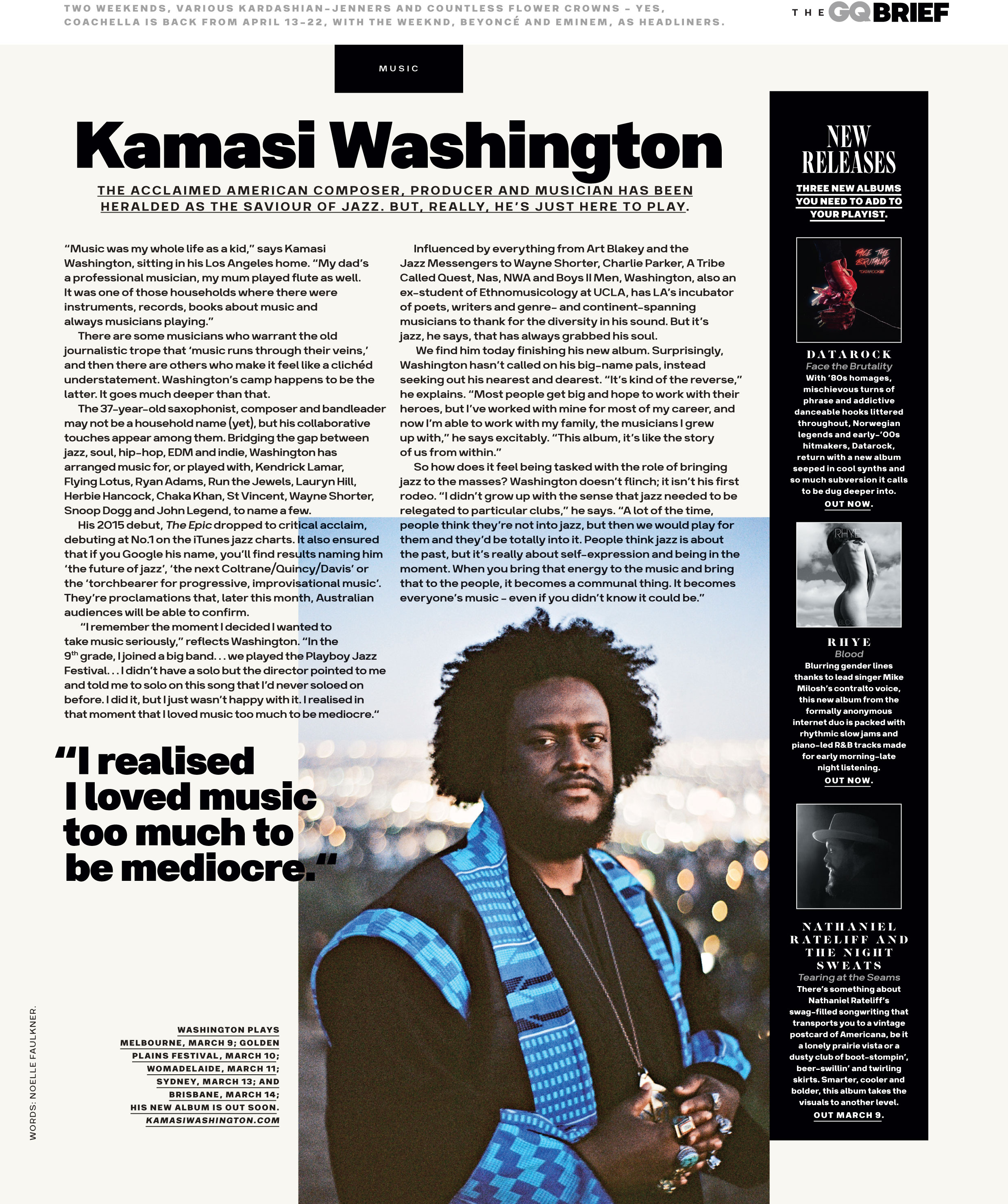
The acclaimed American composer, producer and musician has been heralded as the saviour of jazz. But really, he's just here to play.
“Music was my whole life as a kid,” says Kamasi Washington, sitting in his Los Angeles home. “My dad’s a professional musician, my mum played flute as well. It was one of those households where there were instruments, records, books about music and
always musicians playing.”
There are some musicians who warrant the old journalistic trope that ‘music runs through their veins,’ and then there are others who make it feel like a clichéd understatement. Washington’s camp happens to be the latter. It goes much deeper than that.
The 37-year-old saxophonist, composer and bandleader may not be a household name (yet), but his collaborative touches appear among them. Bridging the gap between jazz, soul, hip-hop, EDM and indie, Washington has arranged music for, or played with, Kendrick Lamar,
Flying Lotus, Ryan Adams, Run the Jewels, Lauryn Hill, Herbie Hancock, Chaka Khan, St Vincent, Wayne Shorter, Snoop Dogg and John Legend, to name a few.
His 2015 debut, The Epic dropped to critical acclaim, debuting at No.1 on the iTunes jazz charts. It also ensured that if you Google his name, you’ll find results naming him ‘the future of jazz’, ‘the next Coltrane/Quincy/Davis’ or the ‘torchbearer for progressive, improvisational music’. They’re proclamations that, later this month, Australian audiences will be able to confirm.
“I remember the moment I decided I wanted to
take music seriously,” reflects Washington. “In the
9th grade, I joined a big band... we played the Playboy Jazz Festival... I didn’t have a solo but the director pointed to me and told me to solo on this song that I’d never soloed on before. I did it, but I just wasn’t happy with it. I realised in that moment that I loved music too much to be mediocre.“
Influenced by everything from Art Blakey and the
Jazz Messengers to Wayne Shorter, Charlie Parker, A Tribe Called Quest, Nas, NWA and Boys II Men, Washington, also an ex-student of Ethnomusicology at UCLA, has LA’s incubator of poets, writers and genre- and continent-spanning musicians to thank for the diversity in his sound. But it’s jazz, he says, that has always grabbed his soul.
We find him today finishing his new album. Surprisingly, Washington hasn’t called on his big-name pals, instead seeking out his nearest and dearest. “It’s kind of the reverse,” he explains. “Most people get big and hope to work with their heroes, but I’ve worked with mine for most of my career, and now I’m able to work with my family, the musicians I grew up with,” he says excitably. “This album, it’s like the story of us from within.”
So how does it feel being tasked with the role of bringing jazz to the masses? Washington doesn’t flinch; it isn’t his first rodeo. “I didn’t grow up with the sense that jazz needed to be relegated to particular clubs,” he says. “A lot of the time, people think they’re not into jazz, but then we would play for them and they’d be totally into it. People think jazz is about the past, but it’s really about self-expression and being in the moment. When you bring that energy to the music and bring that to the people, it becomes a communal thing. It becomes everyone’s music – even if you didn’t know it could be."
Washington plays Melbourne, March 9; Golden Plains Festival, March 10; Womadelaide, March 11; Sydney, March 13; and Brisbane, March 14. His new album, Heaven & Earth is out June 22. kamasiwashington.com